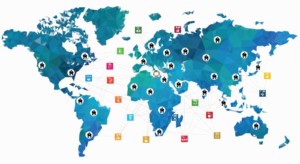True Leadership Starts with Empathy

Our team is wrapping an incredible week at INBOUND (#INBOUND17) in Boston, where we had the chance to expand our network, participate in professional learning and of course eat great food. As you might imagine from a conference that featured Former First Lady Michelle Obama and Brené Brown, leadership was a key topic addressed. Our biggest takeaway from the week was great leadership starts with a focus on empathy.
As many of us know, there is a clear difference between management and leadership. While there is clearly a need for management functions such as budgeting, planning and structure, leadership must come first.
That’s because leadership is about so much more than just managing people: it’s about growing people. And we all have leadership opportunities, whether or not we manage a team of people. We have leadership in ourselves, our relationships, our work and our teams. Leaders lead by example and put relationships first.
 There are many definitions of what makes a great leader. A few traits we think a great leader must possess include:
There are many definitions of what makes a great leader. A few traits we think a great leader must possess include:
- Vision
- Adaptability
- Energy
- Authenticity
- Vulernability
- Empathy
Perhaps most importantly, leadership requires that last bullet – empathy. We often talk about social-emotional learning and the importance of teaching students empathy, but it seems we’ve come to a place where we’ve forgotten that as adults and as leaders we need it as well. Why?
Team members aren’t engaged, there’s high turnover, many of our organizations are now global and more and more work is being done in teams. We need to be vulnerable and aware of another person’s feelings, experiences and understanding.

Here’s five ways to become a better leader, and practice empathy for others:
1) Know Yourself. Where are you as a leader? Where can you improve? From Meyers Briggs to Strengthsfinder 2.0, find one and get to know yourself! Perhaps one of the most crucial parts of knowing yourself, is practicing mindfulness and self reflection. Where can you contribute best? When do you get triggered? How do you maintain balance?
2) Control Yourself. Manage your energy (mental, physical, emotional and spiritual). You will get what you put out in the world. Not energized for your meeting? Your team will notice. Adopt a growth mindset and find joy in learning. When you’re dealing with any situation (positive or negative) make sure you’re adjusting the lens you’re using:
- Long Lens: How will you view this situation in 6 months? Is it worth a reaction, or is there a different way to respond?
- Wide Lens: Regardless of the outcome, how can you learn and grow?
- Reverse Lens: What would the other person (or people) in this situation say, and in what ways might they be right?
3) Be Vulnerable. Brené Brown has made a career on talking about vulnerability. In fact, Brené’s TEDTalk on Vulnerability is one of the most viewed in the world (over 33m). We’ve left this important topic out of leadership and relationships for far too long. It takes courage to be vulnerable but the rewards, as Brené states, are innovation, creativity and change. Perhaps most simply, real vulnerability is showing up and being genuinely seen.
4) Understand Others. You cannot possibly practice empathy if you don’t get to know your team. Find out what makes them tick, what their history is and what experiences may play into how they react, work and engage. Then listen. Practice listening for understanding, not response.
5) Do Something for Others. Create a safe and trusting environment, then assess and understand where your team is today and where they want to be. Facilitate change through inquiry, then support in providing what is needed for a successful outcome.
“We all just need to be empathetic to each other, treat others with kindness” – @MichelleObama #INBOUND17
— Niki Tobar (@NikiTobar) September 27, 2017
Imagine what the world could be like if we led with empathy. We would pause and think about a situation from another perspective before reacting. We would create trusting relationships that allow people around us to grow. Our students would see leaders leading by example at every level. How are you going to practice empathy today?
For more, see:
- Getting Smart Podcast | 5 Lessons on Impact Leadership
- What’s New in Leadership? Lifelong Learning + Project Management
- 10 Reasons Why Lifelong Learning is the Only Option
- Project Management Tools for School and Work
- 11 Tips to Find the Elusive Work/Life Balance
Stay in-the-know with all things EdTech and innovations in learning by signing up to receive the weekly Smart Update.








0 Comments
Leave a Comment
Your email address will not be published. All fields are required.